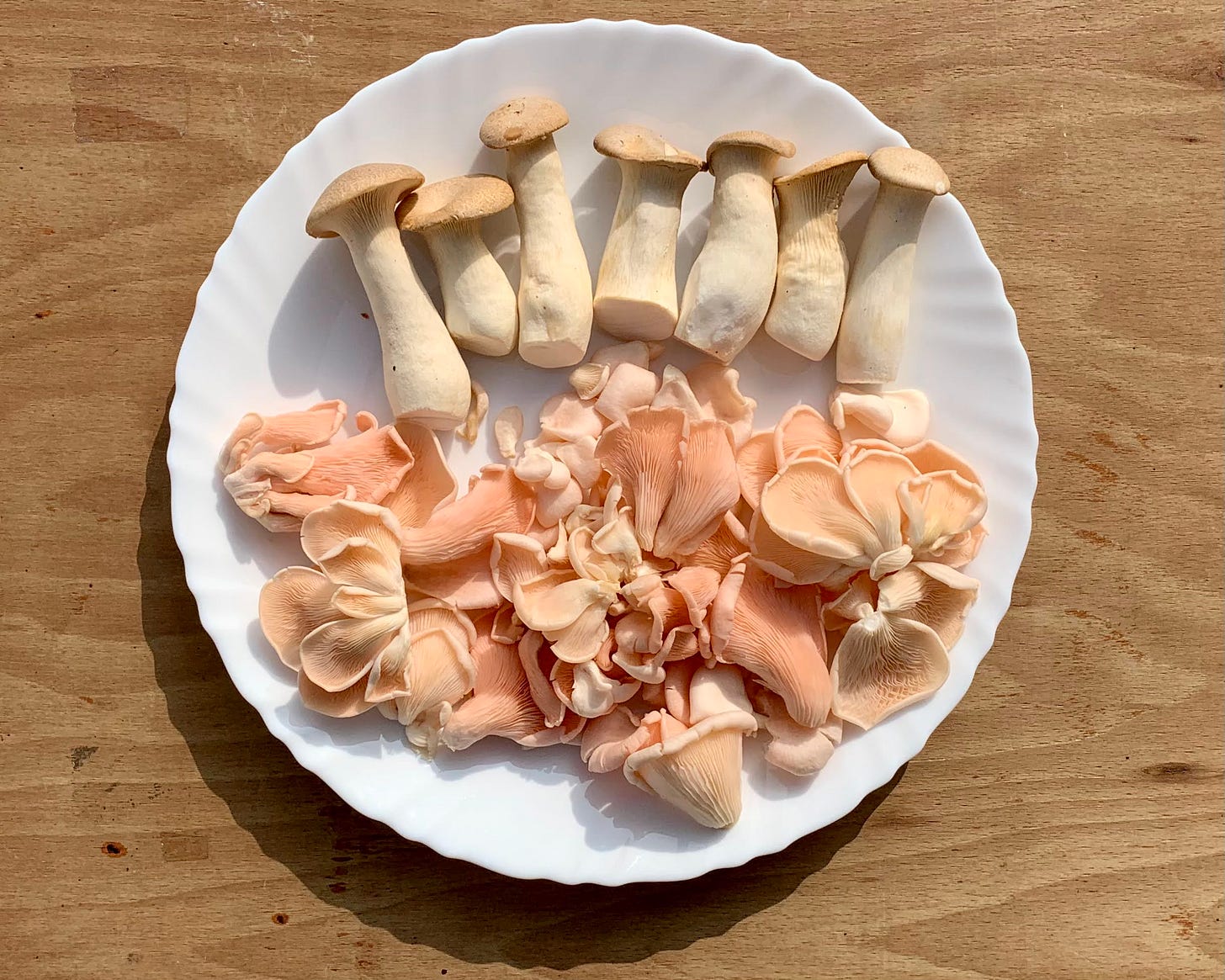"Mushrooms sparked my curiosity, and everything seemed to fall into place."
Open yourself and take what the world has to give
This interview took two conversations and multiple digressions, extended thoughts, and questions that were always answered. It is different from its predecessors because it opened up a whole new world for me. Not that I didn’t know about mushrooms, but I was oblivious to what they mean, symbolise, and give.
When we moved houses a few years ago, my mother was working on reviving a completely barren front lawn by planting, mulching, and taking care of the soil. In a few months, we started noticing tiny mushrooms fruiting, which, she told me signified revival. These tiny mushrooms were a testimony to regeneration and survival.
This is a part of a paid series. If you like to consume our work, please think of subscribing.
You can check out Shroomin’s work here and order a few goods for yourself!!
Rini: Where did you grow up?
Biplab: I grew up in Jamshedpur, Jharkhand, a private industrial town maintained by Tata Steel. It’s a small plateau surrounded by forests and rivers, bordering Odisha, West Bengal, and Bihar. This geographical setting has greatly influenced the local culture and language. Due to Jamshedpur’s steel industry, people from various states have migrated here, creating a rich, diverse community.
The town is home to excellent missionary schools, offering a strong educational foundation. However, after finishing school, higher education opportunities are limited, prompting many students, including myself, to move to larger cities for further studies.
Rini: What was your relationship with food growing up?
Biplab: Growing up, food was more than just sustenance; it was a connection to my roots and a way of life. My community, primarily farmers, cultivated rice and seasonal vegetables. Fresh produce was always within reach, often coming straight from our backyard.
Every meal in our home was a hearty affair, reflecting the labour-intensive work of our community. Our meals were abundant with greens and various vegetables typical of Jharkhand. I took pride in our sustainable farming methods, knowing we were respecting the land that nourished us. Each season brought its flavours to our table, from ripe mangoes in summer to comforting dishes with pumpkins and gourds in cooler months. We enjoyed plantains, jackfruit, papaya, and sweet potatoes, all grown nearby. One personal favourite was Rugra, a local puffball mushroom eagerly anticipated each year.
Food wasn’t just something we ate; it was a reflection of our hard work, connection to the land, and the changing seasons
Rini: You started Shroomin’ during the pandemic. What were you doing before that and what encouraged you to take this route?
Biplab: Before starting Shroomin’ during the pandemic, I worked in events and experiential marketing. I created brand strategies and campaigns, mostly in the entertainment industry, working closely with artists and performers. This experience gave me a broad understanding of business operations, especially in large corporate environments. Over the years, I managed over 500 events across cities like Delhi, Mumbai, Hyderabad, and Bangalore.
When the pandemic hit, I felt burnt out from the fast-paced nature of my work, so the break was a welcome relief. During this time, I fell ill and discovered the benefits of mushrooms as a superfood. Although I had always been interested in growing something, flowers and plants never captured my attention. Mushrooms sparked my curiosity, and everything seemed to fall into place. That’s how Shroomin’ came to be—a combination of timing, personal interest, and the desire to try something new.
Rini: When you talk about your work with mushrooms, it seems nothing short of magical. What is your relationship with them?
Biplab: My relationship with mushrooms has indeed been magical. Since growing my first Paddy straw mushroom (Volvariella volvacea), I’ve felt a deep connection with these incredible organisms. Growing, eating, and sharing mushrooms has transformed my understanding of their role in nature.
Mushrooms are vital ecosystem recyclers, breaking down organic matter and returning essential nutrients to the soil, which supports plant growth and sustains the entire food chain. They often form symbiotic relationships with plants, benefiting both parties. Without mushrooms, dead plant and animal matter would accumulate, disrupting the cycle of life.
What’s even more fascinating is that mushrooms share about 50% of their DNA with humans. This genetic similarity underscores their importance, as they contain unique compounds that enhance our health in various ways, from boosting immunity to improving mental clarity. Understanding mushrooms is about recognizing our deep biological connection with them and their role in maintaining Earth’s balance. This awareness has made my journey with mushrooms truly transformative.
Rini: What are we missing if we don’t know about mushrooms?
Biplab: If we don’t know about mushrooms, we’re missing their crucial role in nature. They decompose organic matter, recycle nutrients, and support plant growth through symbiotic relationships. Additionally, mushrooms offer unique health benefits due to their genetic similarities with humans. Overlooking them means missing out on their ecological importance and their potential to enhance our well-being.
Rini: What part do they play in the grand ecosystems?
Biplab: Mushrooms support ecosystems by breaking down organic matter and enriching the soil. They help plants grow by sharing nutrients, playing a humble but crucial role in maintaining nature’s balance.
Rini: You mentioned foraging mushrooms from parts of Orissa and Jharkhand. Can you elaborate on this practice and its role in local culture?
Biplab: Foraging mushrooms in Orissa and Jharkhand is a traditional practice deeply rooted in local culture, especially among indigenous tribal communities. These regions, rich in forests, offer a variety of wild mushrooms, particularly during the monsoon season. Varieties like Termitomyces (Putka or Rugda), Agaricus (Khukdi), and Russula (Bhaunra) are highly prized for their nutritional and economic value. Locals use their knowledge to identify edible mushrooms, which are integral to their diet and sold in markets. This sustainable foraging practice supports livelihoods and preserves cultural heritage through traditional dishes and culinary practices.
Rini: Lastly, how can one start their “Shroom” Journey? What should we be reading/consuming?
Biplab: Starting a journey with mushrooms is exciting and rewarding. Begin by learning about functional and medicinal mushrooms like Reishi, Lion’s Mane, and Cordyceps, which offer various health benefits and can be used as daily supplements.

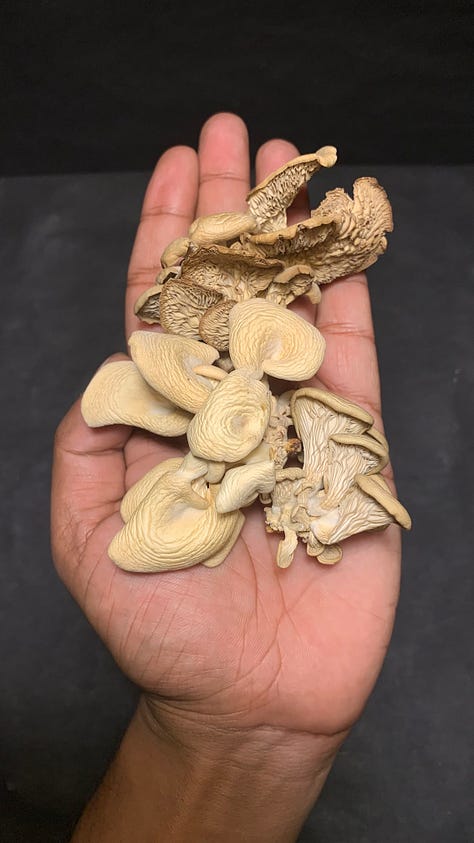
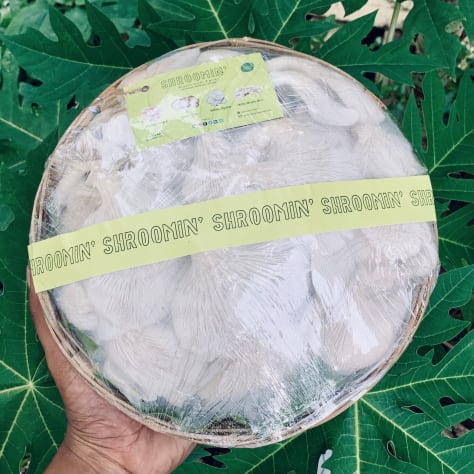
Given the relatively low awareness of mushrooms in our country, explore how these fungi can be incorporated into everyday culinary practices. Research suggests that dried mushrooms are more potent and have a longer shelf life, making them ideal for long-term use. To get started, consider reading books on medicinal mushrooms and exploring reliable online resources. Experimenting with dried mushrooms in your diet is a practical step. Engaging with online mycology communities can also deepen your understanding and appreciation of mushrooms.
Some of my favourite books are:
Mushrooms at the End of the World by Anna Tsing
Entangled Life by Merlin Sheldrake
The Magic of Mushrooms
The Lives of Fungi
The Secret Life of Fungi
Cooking With Mushrooms
Psilocybin Mushrooms of the World
The Way Through the Woods
Rini: How do you want the future of mushrooms to look like?
Biplab: The future of Shroomin’ and my journey is centred on growth, collaboration, and creativity. I believe learning is a continuous, collective process. The future of Shroomin’ involves communities coming together to support and learn from each other.
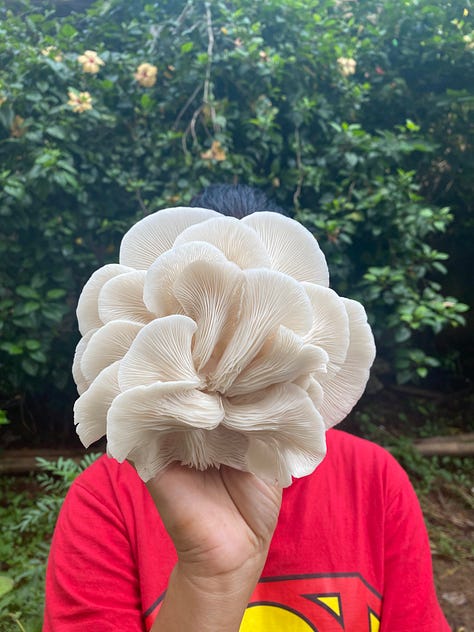

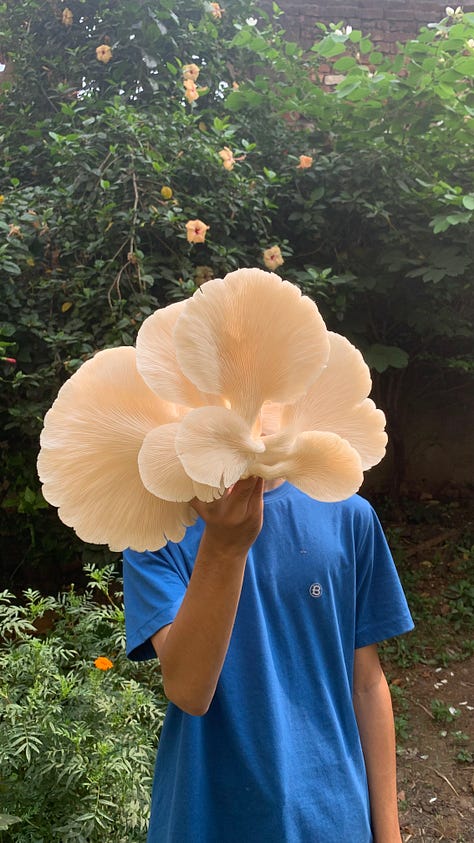
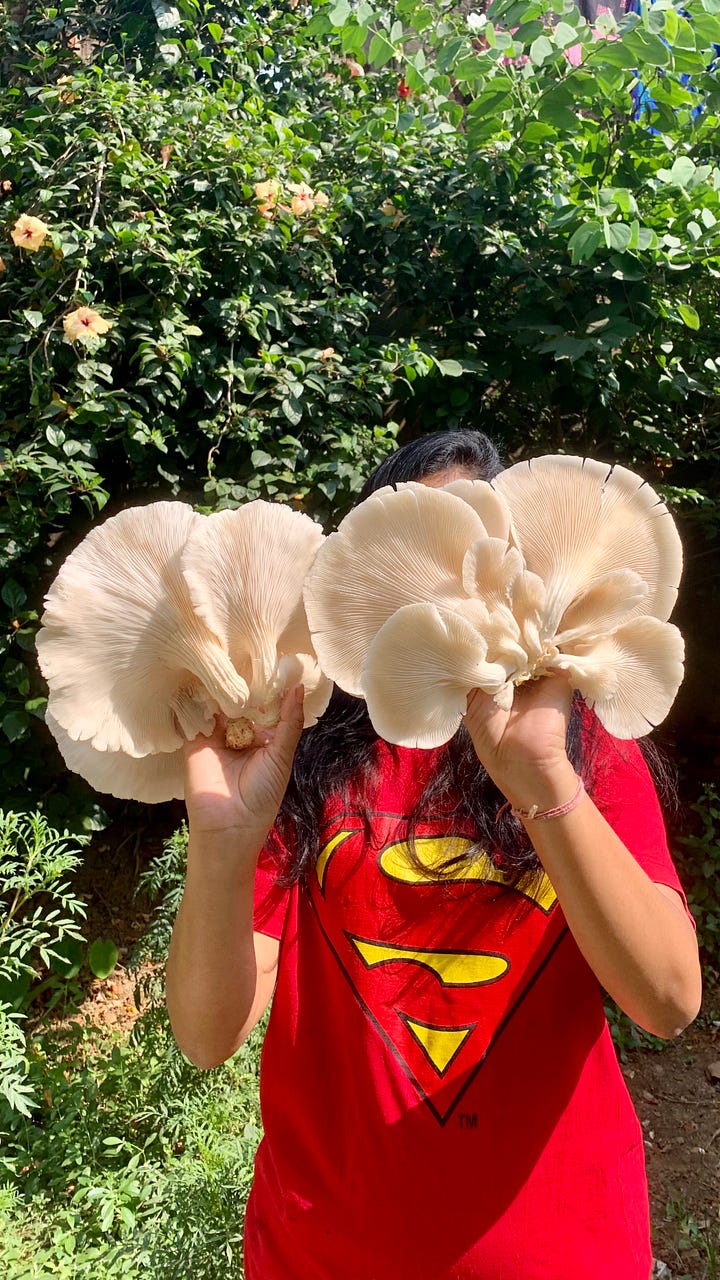

My vision extends beyond farming to incorporating art and craft into our journey. Fungi are connected to creativity, and I envision a community where we cultivate mushrooms while exploring their role in inspiring art, design, and sustainable crafts. This could include using mushroom-based materials for eco-friendly products, creating art that reflects fungi’s natural beauty, or organizing workshops for mushroom-inspired crafts.
By fostering spaces for knowledge-sharing, creativity, and everyday practices, we can engage more people, especially the younger generation, in understanding fungi’s importance and their connection to our planet. Although my journey is still unfolding, I see the future as one of collaboration—building a collective that values, learns from, and finds inspiration in the natural world around us. Shroomin’ is not just about farming; it’s about creating a community that appreciates and is inspired by the world of mushrooms.
You can check out Shroomin’s work here and order a few goods for yourself.
This interview is part of a new series called "Adjacent,” where we document conversations, interviews and snippets of people in our community who don’t directly work in food, but their work influences food, culture, and eating in many ways.
Adjacent means next to something, neighbouring, the periphery of one thing almost merging with another. The goal of this series is to expand the literature, knowledge and ideas that exist in those intersecting spaces. We will talk to environmentalists, business owners, designers, workers, growers and educators who influence what we consume ( literally and figuratively).
This series will be accessible to paid subscribers. Please support the two-people team behind dhoop by paying for a monthly/yearly subscription of our newsletter. We promise to bring only valuable content to you.






